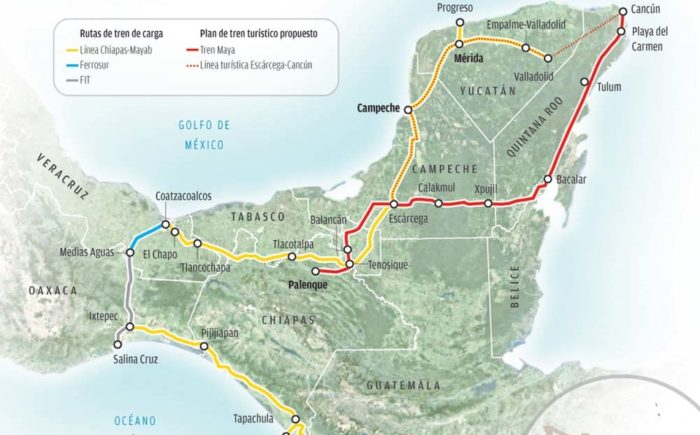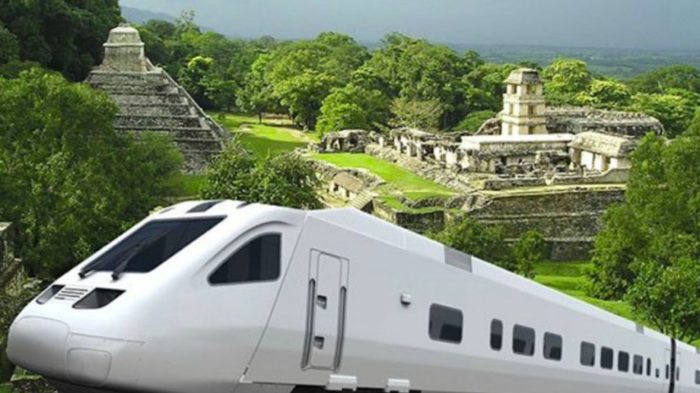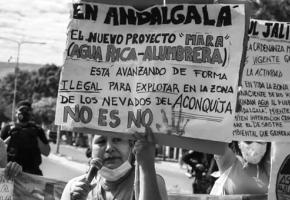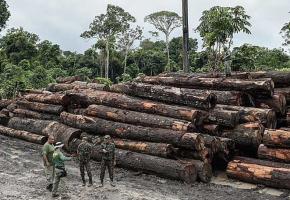The Tren Maya is a top priority for Mexico’s new president Andres Manuel López Obrador. The 1500 kilometre line aims to link five states in the poor south-east to boost tourism and local industry, but has immediately become controversial over fears that it will damage the region’s archaeological treasures and great natural riches.
Whilst businessmen are competing to win lucrative construction contracts, social and indigenous groups, academics, and environmentalists have raised their voices to oppose the megaproject.
The Tren Maya is intended to offer cargo and tourist passenger traffic and connect the states of Chiapas, Tabasco, Campeche, Yucatán and Quintana Roo.
These are the heartlands of Mayan culture, and contain ecological reserves such as Calakmul and Sian Ka’an, as well as famous archaeological centres such as Palenque, Chichen-Itzá and Tulúm that attract thousands of visitor every year.
According to Pesident López Obrador, the train will mainly use existing lines built in the last century, which will be rehabilitated. Parts of the Tren Maya route will be upgrades to existing lines ‘No land will be expropriated, no small properties, no farm co-operatives. And 50,000 hectares of fruit trees will be planted,’ he told reporters. Consultation: little, late and hurried
Saccharine and beyond-bland publicity video for the Tren Maya project. It’s worth reading the comments below the YouTube post.
The Tren Maya, among other initiatives by the president and his left-wing MORENA (Movement of National Regeneration), was put to a nationwide referendum on 24-25 November 2018.
The referendum has been criticised both for the speed with which it was organised, and because only 850,527 Mexican voters took part, less then one per cent of those eligible to vote.
Local experts also claim the referendum violated international accords, in particular ILO (International Labour Organisation) Agreement 169, which stipulates that that governments are obliged to undertake prior consultation with indigenous groups over any measure of this kind that affects them and that they are the ones must decide the priorities of any such initiative.
Official sources claim that the indigenous peoples and communities will be consulted throughout 2019, but as Fátima Gamboa, from the National Network of Indigenous Lawyers, says: ‘the stipulation of prior and informed consultation has already been violated’. She adds that any consultation will be ‘to reach a few agreements and dampen down conflicts.’
This promotional video, published apparently by the presidency of AMLO, is no better. It describes itself as ‘a message addressed to young people of up to 90’.
EZLN opposition
For its part, the EZLN (Zapatista National Liberation Army) based in Chiapas, who are long-time critics of López Obrador, have declared their rejection of not only the Tren Maya but other megaprojects of the new government. On January 1 2019, 25 years since its first appearance, EZLN subcommander Moisés declared that the Zapatistas would fight these proposals, and that they will not allow López Obrador ‘to come here with his destructive projects’.
The EZLN declaration comes shortly after President López Obrador took part in an indigenous ritual to ask permission from Mother Earth for the construction of the Tren Mayan. Biodiversity at risk
Many Mexican environmental campaigners say the proposed railway line will cross protected nature reserves and disrupt corridors for flora and fauna.
‘These lines could be very harmful for nature, not just because of the effects of the train itself, but above all because of the growth in population and infrastructure in the region, which could devastate natural resources,’ says Casandra Reyes García, of the Yucatán Scientific Research Centre.

In November 2018, shortly before the referendum on the López Obrador government’s priority schemes, a group of Mexican academics sent him a letter warning that a project of this size could not be undertaken without a thorough review of its ecological, cultural and archaeological impact.
Their letter emphasizes that ‘sites of great biodiversity must be preserved according to the strictest international standards, recognising the wisdom of the original people who have always been guarantors of these territories and trustees of our country’s natural and cultural wealth.’
In official documents, the government explains that the Tren Maya, due to start operating in 2022, is an ‘integrated project for regional development that aims to boost the economy through tourism and local initiatives, strengthen social development, promote and safeguard Mayan culture, and protect the environment.’
But on 13 February 2019, in the national Chamber of Deputies, Environment Minister Josefa González Blanco admitted that the environmental impact of the Tren Maya is as yet unknown, because so far the project has only reached the stage of being put out to tender.
Shortly before her declaration, the director of the National Tourist Board, Rogelio Jiménez Pons, caused controversy when he told the press that development is bound to affect the natural environment: ‘We won’t get anywhere if we have fat jaguars and starving children,’ he said.
Elva Narcia is the founder of glifoscomunicaciones.org, one of LAB’s partners in Mexico. The article was translated from Spanish by Nick Caistor. Find more great articles on Latin American current affairs at www.lab.org.uk
















